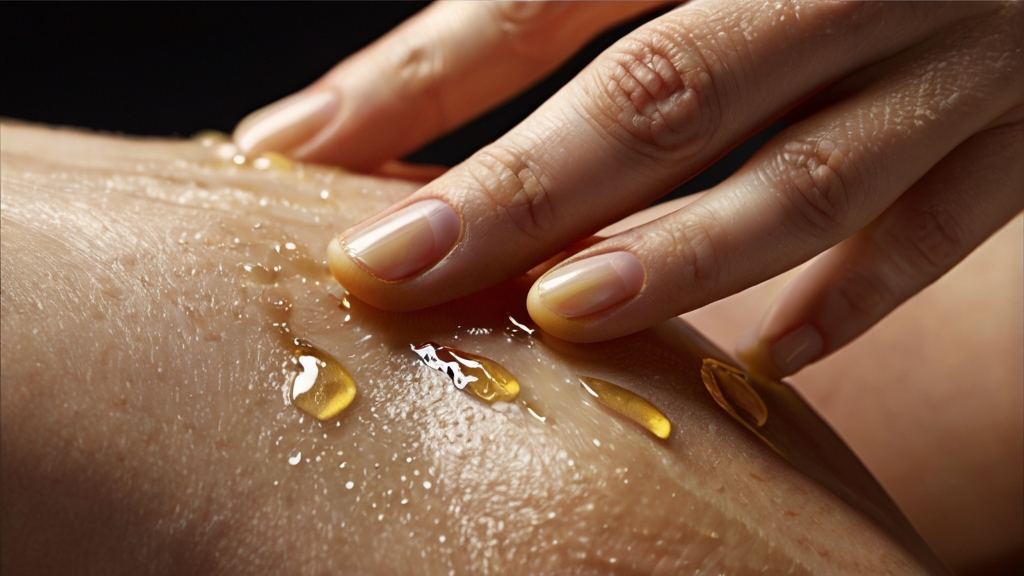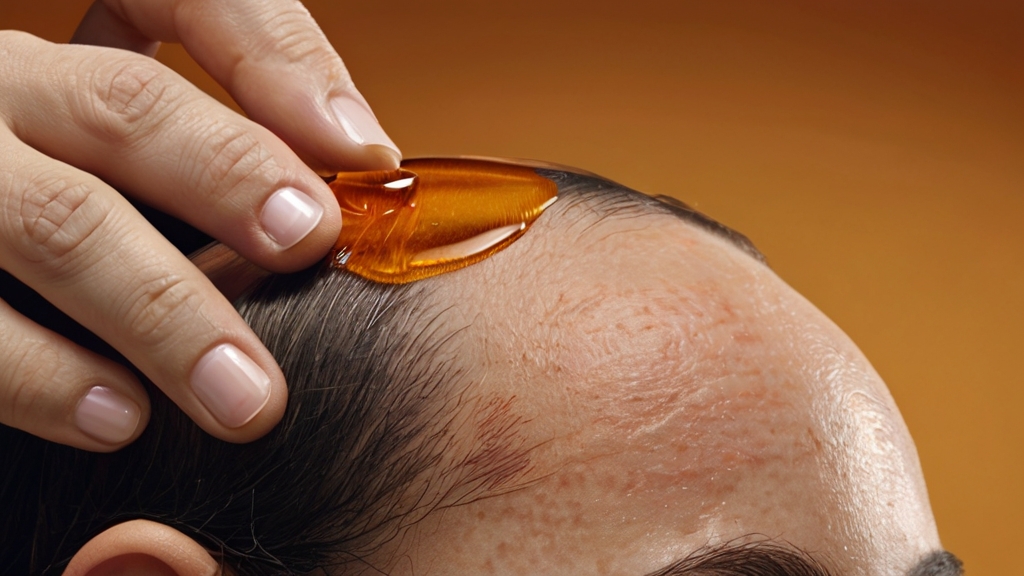
Amira Benhima
A passionate advocate for holistic wellness and natural beauty, is an accomplished author specializing in the benefits and uses of Argan oil, with years of experience exploring its wonders.
Key Takeaways
Are you tired of dealing with the dry, itchy, and flaky skin caused by psoriasis? If so, you may be interested in exploring the potential benefits of Moroccan Argan Oil. Derived from the seeds of the Argania spinosa tree, this oil is rich in vitamin E, squalene, and fatty acids. These components have been found to have moisturizing and anti-inflammatory properties that can help alleviate the symptoms of psoriasis. But is Argan Oil the solution you’ve been looking for? Keep reading to discover how it works and whether it could be a game-changer in managing your psoriasis.
- Moroccan Argan Oil is rich in vitamin E, squalene, and fatty acids, which offer moisturizing and anti-inflammatory properties for psoriasis management.
- The anti-inflammatory properties of Argan Oil, including monounsaturated fatty acids and powerful antioxidants like polyphenols and tocopherols, help reduce redness, swelling, and itching associated with psoriasis.
- Argan Oil soothes psoriasis symptoms by reducing inflammation, relieving redness, itching, and flaking skin, and promoting wound healing while maintaining the skin’s protective barrier.
- The moisturizing effects of Argan Oil are beneficial for psoriasis relief, as it restores and maintains skin hydration, forms a protective barrier to prevent moisture loss, and improves skin elasticity and barrier function.
Benefits of Moroccan Argan Oil for Psoriasis

Using Moroccan Argan oil for psoriasis offers several benefits, helping to reduce redness, itching, and flaking skin while improving overall skin health. Moroccan Argan oil, also known as liquid gold, has been used for centuries for its therapeutic properties. Its unique blend of vitamins and nutrients make it an effective treatment for psoriasis symptoms.
One of the main benefits of Moroccan Argan oil for psoriasis is its ability to moisturize and nourish the skin. Psoriasis often causes dry patches, and the rich fatty acids and antioxidants in Argan oil help to retain moisture and soothe the skin. Regular use of Argan oil can improve the overall health of the skin, leaving it soft, supple, and hydrated.
In addition to its moisturizing properties, Argan oil also has anti-inflammatory and healing effects. Psoriasis is characterized by inflammation, and the anti-inflammatory compounds in Argan oil can help reduce redness and swelling. It also helps repair scarred skin and damaged nails, which are common symptoms of psoriasis.
Another benefit of Moroccan Argan oil is its antibacterial and antifungal properties. Psoriasis can sometimes lead to skin infections, and the natural compounds in Argan oil can help prevent and treat these infections. The high content of monounsaturated fatty acids, squalene, polyphenols, and tocopherols contribute to its antibacterial and antifungal effects.
Anti-inflammatory Properties of Argan Oil

Argan oil possesses anti-inflammatory properties that can be beneficial for managing psoriasis. These properties help reduce inflammation, soothe skin irritation, and alleviate symptoms like redness, itching, and flaking. By applying argan oil to slightly damp skin, it can provide relief for the dry and brittle skin often associated with psoriasis, making it a natural and effective treatment option.
Inflammation Reduction Benefits
The anti-inflammatory properties of argan oil make it an effective solution for reducing inflammation associated with psoriasis. Here are three ways in which argan oil can help in inflammation reduction:
- Monounsaturated fatty acids: Argan oil contains a high content of monounsaturated fatty acids, which have been shown to have anti-inflammatory effects. These fatty acids help to calm the immune system response, reducing inflammation and soothing the skin.
- Polyphenols and tocopherols: Argan oil is rich in polyphenols and tocopherols, which are powerful antioxidants. These compounds have anti-inflammatory properties and can help to reduce redness, swelling, and itching associated with psoriasis.
- Vitamins and nutrients: Argan oil is packed with essential vitamins and nutrients that support skin health. These include vitamin E, which has anti-inflammatory properties, and other nutrients that help to nourish and protect the skin’s barrier, reducing inflammation and promoting healing.
Soothing Psoriasis Symptoms
To alleviate symptoms of psoriasis, argan oil offers a soothing solution through its potent anti-inflammatory properties. Moroccan argan oil contains vitamin E, a powerful antioxidant that helps reduce inflammation in the skin. This oil is rich in monounsaturated fatty acids, squalene, polyphenols, and tocopherols, all of which contribute to its anti-inflammatory benefits. Regular use of argan oil can help soothe psoriasis symptoms like redness, itching, and flaking skin. Additionally, the hydrating effects of argan oil can provide relief for dry and brittle skin, which are common in psoriasis. Furthermore, argan oil can be applied topically to promote wound healing and maintain the skin’s protective barrier. Overall, incorporating argan oil into your psoriasis management routine can help manage symptoms and provide soothing relief for your skin.
Calming Skin Irritation
Can argan oil effectively calm skin irritation caused by psoriasis? Yes, it can. Argan oil contains anti-inflammatory properties that help soothe and calm the skin, making it a beneficial treatment for managing psoriasis symptoms. Here are three ways argan oil can help calm skin irritation:
- Anti-inflammatory effects: The high content of monounsaturated fatty acids, squalene, polyphenols, and tocopherols in argan oil contribute to its anti-inflammatory effects. Regular application of argan oil can reduce redness, itching, and flaking skin caused by psoriasis.
- Retains natural moisture: The unique blend of vitamins and nutrients in argan oil helps retain the body’s natural moisture. This effectively treats dry skin patches and provides relief from the pain and itchiness associated with psoriasis.
- Maximizes effectiveness: Applying argan oil to slightly damp skin can maximize its ability to calm skin irritation and provide relief for psoriasis.
Incorporating argan oil into your psoriasis management routine can help alleviate skin irritation and improve overall skin health.
Moisturizing Effects for Psoriasis Relief

Using argan oil as a moisturizer can provide relief for psoriasis symptoms. Psoriasis is a chronic autoimmune condition where the immune system attacks healthy skin cells, resulting in red, scaly patches. These patches can be itchy, painful, and can cause significant discomfort. One common symptom of psoriasis is dry skin, which can exacerbate the condition and make the patches even more uncomfortable.
Argan oil, derived from the kernels of the argan tree, has been used for centuries in Morocco for its moisturizing properties. It is rich in essential fatty acids, such as linoleic acid and oleic acid, which help to restore and maintain skin hydration. When applied topically, argan oil forms a protective barrier on the skin, preventing moisture loss and promoting skin softness and elasticity.
Research has shown that argan oil can effectively moisturize the skin and improve its barrier function. A study published in the Journal of Cosmetic Dermatology found that applying argan oil twice daily for four weeks resulted in increased skin hydration and a significant reduction in skin dryness. Another study published in the International Journal of Molecular Sciences demonstrated that argan oil can enhance skin barrier function by reducing transepidermal water loss and improving skin elasticity.
Argan Oil as a Protective Skin Barrier

Argan oil, with its rich content of vitamin E, squalene, and fatty acids, forms a protective barrier on the skin, helping to shield it from external irritants and maintain optimal hydration levels. This is particularly beneficial for individuals with psoriasis, a chronic autoimmune condition that causes red, scaly patches on the skin. The protective barrier created by argan oil can help alleviate psoriasis symptoms and promote healthier skin.
Here are three key points about the protective skin barrier provided by argan oil:
- Hydration: The vitamin E and fatty acids in argan oil help to lock in moisture and prevent water loss from the skin. This is important for individuals with psoriasis, as dryness and dehydration can exacerbate symptoms and lead to increased skin irritation. By forming a protective barrier, argan oil helps to maintain optimal hydration levels and keep the skin moisturized.
- Protection from irritants: Psoriasis-prone skin is often more sensitive and prone to irritation from external factors such as harsh chemicals, allergens, and environmental pollutants. The protective barrier created by argan oil acts as a shield, preventing these irritants from coming into direct contact with the skin and triggering flare-ups. This can help reduce inflammation and discomfort associated with psoriasis.
- Support for topical treatments: Argan oil can be used in conjunction with moisturizers or topical medications prescribed for psoriasis management. By applying argan oil to slightly damp skin, it can help enhance the absorption and effectiveness of these treatments. Additionally, the hydrating properties of argan oil can help counteract the potential drying effects of some psoriasis medications.
Healing Properties of Argan Oil for Psoriasis

The healing properties of argan oil have shown promise in managing psoriasis symptoms and promoting skin healing. Psoriasis is a chronic immune-mediated skin condition that affects millions of people worldwide. Argan oil, a natural oil derived from the kernels of the argan tree native to Morocco, has gained attention for its potential therapeutic effects on psoriasis.
Argan oil contains vitamin E, fatty acids, and squalene, which are known for their hydrating and moisturizing properties. These components can help soothe and hydrate dry, brittle skin commonly associated with psoriasis. The oil’s anti-inflammatory properties may also aid in reducing redness and inflammation caused by psoriasis, promoting the healing of the skin.
Regular use of argan oil can help manage psoriasis symptoms such as itching and flaking. It can be used as a standalone treatment or in conjunction with other moisturizers or topical medications. By providing relief for psoriasis-affected areas, argan oil can improve the overall comfort and quality of life for individuals living with this condition.
Argan oil has also shown potential in providing relief for scalp psoriasis. Its hydrating effects can help exfoliate the skin and thin out scaly areas on the scalp, reducing itching and flaking. Regular use of argan oil on the scalp may help manage scalp psoriasis symptoms and improve the condition of the scalp.
Topical Application of Argan Oil for Psoriasis

To effectively apply argan oil for psoriasis management, start by ensuring your skin is slightly damp. Gently massage a few drops of argan oil onto the affected areas, allowing it to absorb into the skin. For scalp psoriasis, gently massage the oil onto the scalp, focusing on areas with scales. Remember to consult a dermatologist, patch test, and explore alternative options if needed.
Efficacy of Argan Oil
When considering the effectiveness of topical application of argan oil for psoriasis management, it is important to examine the evidence-based research available. Here are three key points to consider:
- Argan oil contains various active compounds that can help alleviate psoriasis symptoms. It is rich in antioxidants, essential fatty acids, and vitamins, which have been shown to have anti-inflammatory and moisturizing properties.
- Pure argan oil can be directly applied to the affected area. It is recommended to use a few drops of argan oil and gently massage it into the skin. This can help soothe the irritation, reduce redness, and promote the healing of psoriatic plaques.
- Some studies suggest that argan oil may also benefit individuals with psoriatic arthritis. The anti-inflammatory properties of argan oil can help reduce joint pain and swelling associated with this condition.
While argan oil has potential health benefits for psoriasis management, it is important to consult with a healthcare professional before incorporating it into your treatment regimen.
Application Techniques
For effective management of psoriasis, applying argan oil topically can be a beneficial technique. Argan oil, derived from the kernels of the argan tree native to Morocco, is known for its potential to alleviate symptoms of psoriasis. To use argan oil for psoriasis, start by cleansing the affected area with a mild cleanser and patting it dry. Then, apply a few drops of argan oil to the affected skin and gently massage it in. This can help treat dry, flaky skin commonly associated with psoriasis. The moisturizing properties of argan oil can also help soothe itchiness and reduce inflammation. Additionally, argan oil may help treat psoriatic arthritis, a condition that affects the joints in psoriasis patients. Using argan oil regularly can contribute to the overall management of psoriasis symptoms.
Using Argan Oil for Scalp Psoriasis

Argan oil can be an effective treatment option for managing scalp psoriasis. This oil, derived from the kernels of the Argania spinosa tree, has been used for centuries in Morocco for its numerous health benefits. When it comes to scalp psoriasis, argan oil can help soothe inflammation, reduce itching, and moisturize the scalp. Here are three reasons why using argan oil for scalp psoriasis can be beneficial:
- Anti-inflammatory properties: Argan oil contains high levels of antioxidants and fatty acids, which have anti-inflammatory effects. These properties can help calm the overactive immune system response that leads to psoriasis symptoms. Applying argan oil to the scalp can reduce redness, swelling, and irritation associated with scalp psoriasis.
- Moisturizing effects: Psoriasis often causes dryness and flakiness of the scalp. Argan oil is rich in vitamin E and essential fatty acids, which can deeply moisturize the scalp and promote healing. Regular use of argan oil can help restore the skin’s natural moisture barrier and prevent further dryness and flaking.
- Scalp nourishment: Argan oil is packed with nutrients that can nourish the scalp and promote healthy hair growth. It contains vitamin E, which improves blood circulation and stimulates hair follicles. Additionally, argan oil can help strengthen the hair shaft, making it less prone to breakage and damage.
To use argan oil for scalp psoriasis, simply massage a few drops onto the affected areas of the scalp. Leave it on overnight or for a few hours before rinsing it off. For best results, repeat this process regularly. However, it’s important to note that argan oil may not work for everyone, and it’s always best to consult with a healthcare professional before starting any new treatment.
Frequently Asked Questions
Is Argan Oil of Morocco Good for Psoriasis?
Argan oil can be beneficial for psoriasis management due to its hydrating properties and potential anti-inflammatory effects. It can help with symptoms like dryness and scaling on the skin and scalp. Consider trying natural remedies like argan oil to improve skin hydration and reduce psoriasis triggers.
How Long to Leave Coconut Oil in Hair Psoriasis?
To effectively manage psoriasis, leave coconut oil in your hair for at least 30 minutes or overnight for deeper treatment. The duration can vary based on your preference and hair condition. Regular use can alleviate symptoms and promote healthier hair.
How Do You Use Scalp Oil for Psoriasis?
To use scalp oil for psoriasis relief, massage it into your scalp using circular motions. Look for natural remedies with essential oils, like argan oil, to benefit from their hydrating and soothing properties.
What Is the Promising Treatment for Psoriasis?
New drug therapies, lifestyle modifications, phototherapy options, natural remedies, biologic medications, topical treatments, stress management techniques, and dietary changes are promising treatments for psoriasis. These options aim to reduce symptoms and improve quality of life.
Related Articles
Topical Argan Oil Application for Acne
Get ready to discover the golden secret to banishing acne with topical Argan oil that will leave you wanting more.
Vegan Argan Oil Skin Moisturizer Brands
Looking for a vegan argan oil skin moisturizer brand that will leave your skin feeling nourished and hydrated? Find out which top brand starts with the letter 'F'!
Blending Argan Oil With Other Acne Remedies
Knead your way to clearer skin as we explore the powerful combination of argan oil and other acne remedies, revealing the secrets to a healthier complexion.


